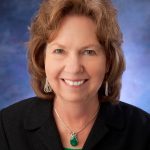On March 10, Janet Poole, PhD, OTR, professor of the occupational therapy graduate program at the University of New Mexico in Albuquerque, will continue the ARHP’s Audioconference/Webcast Series with the management of scleroderma. Dr. Poole received her BS in occupational therapy from Colorado State University, her MA degree in educational psychology from the University of North Carolina, Chapel Hill, and her PhD in motor learning/motor control from the University of Pittsburgh. Dr. Poole’s research interest is in scleroderma and the functional impact of the disease on the tasks of daily living, oral hygiene, parenting, and employment. She has conducted a number of studies examining rehabilitation interventions with people who have scleroderma and, with a colleague, is developing a self-management program for these patients. She has also authored several textbook chapters on rehabilitation for people with scleroderma.
Dr. Poole’s first introduction to patients with scleroderma started as an occupational therapist in 1984 when she met two doctors at the University of Pittsburgh that inspired her to examine hand functions in patients with scleroderma. During her studies, Dr. Poole became very intrigued with the difficulty patients were having with many of their daily routines and during leisure activities. She continued her research because there was very little being reported on patients with scleroderma to guide occupational and physical therapists.
“There are approximately 300,000 people in the U.S. who have scleroderma according to the Scleroderma Foundation, and it is very different from a lot of the other types of rheumatic diseases due to skin hardening, ulcers, and difficulty swallowing,” explains Dr. Poole. “Scleroderma is a connective tissue disease and calls for more aggressive stretching exercises when compared to other rheumatic diseases.”
The biggest portion of Dr. Poole’s discussion will focus on exercise, oral hygiene, and managing daily tasks. She will review the classification and symptoms of systemic sclerosis and discuss management strategies for joint motion, exercise, pain control, daily tasks including oral care, and fatigue. In addition, she will look at Raynaud’s phenomenon as it relates to these patients and will review the evidence for rehabilitation interventions.
There are approximately 300,000 people in the U.S. who have scleroderma according to the Scleroderma Foundation, and it is very different from a lot of the other types of rheumatic diseases.
—Janet Poole, PhD, OTR
To register for the March 10 audioconference/ Webcast, contact Sharon Ross at (404) 633-3777, ext. 802 or visit www.rheumatology.org/arhp. CME and certificates of participation will be offered to paid registrants. If you are unable to participate, you can purchase a recording of the session at www.rheumatology.org/arhp.
ARHP Graduate Student Award
Do you know a student who has shown an interest in planning a research or clinical pro-ject with relevance to rheumatology? If you are an ACR/ARHP member looking to make a difference in a graduate student’s future—and in the future of rheumatology—consider mentoring a student this year.
The two top-rated proposals based on scientific merit, rigor, and potential significance to the field will be eligible for:
- A $500 award;
- Free registration to, and recognition at, the 2009 annual scientific meeting in Philadelphia; and
- Free ARHP membership for one year.
PhD candidate Mary Westby, BSc (PT), says of her experience as an award recipient, “I was thrilled to have been chosen as one of two graduate students to receive the 2008 ARHP Graduate Student Award. As a longstanding member of the ARHP, I appreciate all that they do to support students, promote rheumatology research among allied health professionals, and offer mentorship opportunities. My PhD supervisor, Dr. Catherine L. Backman, has been a mentor to many PT and OT clinicians at the Mary Pack Arthritis Centre over the years and was the perfect choice when I was looking for a thesis supervisor in the summer of 2004. She has offered me additional opportunities to become involved in AHRP activities and introduced me to colleagues and researchers who have become invaluable to my research efforts.”
Now is the time to help attract talented individuals to rheumatology. Mentorship is mutually beneficial experience that will allow you to share your passion for helping patient with rheumatic diseases with students like Westby. Applications are now being accepted; for complete information go to: www.rheumatology.org/arhp.Help Patients with Scleroderma Manage Musculoskeletal and Functional Limitations


